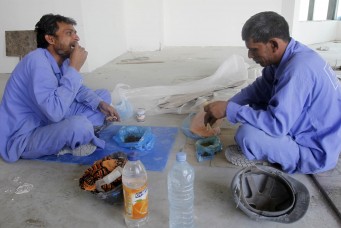Trends in Qatar Stand-Off
Is Qatari diplomacy and policy outperforming the Saudi Arabian-UAE-led camp in the Gulf’s ongoing confrontation?
The nearly two-month-old political assault and siege of Qatar by Saudi Arabia, the United Arab Emirates (UAE) and some dependent states has settled down into a tug-of-war whose many dynamics will determine how it ends one day. My impression is that Qatar is outperforming the Saudi-UAE-led camp (or rather, they are shooting themselves in the foot) in the four main arenas of this confrontation: political bravado and its media propaganda, economic pressures and costs, legal disputes anchored in international rule-of-law conventions, and public opinion trends and national reputations in the global sphere.
- The Saudis-Emiratis have maintained a very impressive demeanor of confidence, strength, determination, patience, and a willingness to punish Qatar severely, and for years, for its alleged transgressions in supporting terrorism and threatening their security. Their problem with this display of political bravado is that nobody else buys it, and they are awkwardly isolated in their tent woven of threads of bravado. This is mainly because their accusations are wildly exaggerated, and also hypocritical on core complaints like funding Islamist movements, having relations with Iran, or interfering in other states’ affairs. The Saudi-Emirati media propaganda pushing such accusations has been embarrassing in its ultra-thin doses of truth, and wildly counter-productive, serving only to further damage the credibility that some GCC media did enjoy in recent years.
- The economic pressures and costs that Qatar suffered due to its inability to use the land, sea or air space of its siege-happy neighbors were a temporary shock that it quickly overcame when many countries near and far came to its aid. The extra costs of longer air and sea routes are peanuts compared to Qatar’s financial reserves. The stronger and more diversified economic and political ties that Qatar has quickly forged with countries near and far, including powers like Iran, Turkey, India and others, will far outweigh the short-term burden of paying more for jet fuel and other extra costs incurred from the siege; they will also fortify it diplomatically. Somebody should tell the siege-masters that their siege has made Qatar stronger at home and abroad, not weaker.
- An important stage of the dispute is coming into focus this week, as Qatar takes legal action against the siege states in assorted international forums. It has filed a complaint with the World Trade Organization (WTO) to challenge the Saudi-UAE-Bahrain trade boycott, and requested “consultations” with them as the required first step in resolving such a trade dispute. Qatar has also asked the International Civil Aviation Organization (ICAO) to end the air blockade on it, citing the damage it causes to Qatar and to flight safety in the region. The ICAO this week called on all member-states to comply with the 1944 Chicago Convention on International Civil Aviation and its addendums. Qatar wants the siege states to designate emergency air corridors for Qatari flight, and subsequently to drop their air blockade totally.
Such important moves force all states concerned to behave on the basis of their legal and diplomatic commitments to the international rule of law—rather than to any self-absorbed displays of macho neighborhood bullying and chest-thumping. Focusing on the rule of law should force all the GCC states to agree on how to define “terrorism,” and therefore clarify whether any of them, or most of them, support “terror” movements. Qatar started this important political, technical, and legal process in its bilateral agreement with the United States last month to cooperate to fight terrorism. The Saudi-Emirati siege-happy states would do well to undertake a similar exercise, and do it collectively with Qatar and others in the region, so that this wasteful feud can be resolved rationally, rather than perpetuating the current display of irrational fears and hysterical threat perceptions.
- In the court of global public opinion, the Qataris appear to be much more sensible, consistent, focused, and precise, while the Saudi-Emirati-led states seem to express genuine anger and fear accompanied by unrealistic and unreasonable demands, but without convincing evidence for their accusations. The exception to this is the six-point demands about fighting terror and promoting GCC-wide mutual respect and stability that they issued in late June, which were widely assumed to have replaced the original ridiculous 13 non-negotiable demands on Qatar that will go down in modern history as a master-class in failed interference in the internal affairs of another state.
The last meeting of the four siege-masters’ foreign ministers over the weekend repeated the original 13 demands, alongside the subsequent six principles. They sensibly said they were ready for dialogue with Qatar if it showed willingness to fight terrorism and not interfere in other countries’ affairs (which Qatar agrees to, being a sensible state), but they also demanded that Qatar accept the original 13 demands. So the Saudi-Emirati demands on Qatar keep evolving, and their willingness to negotiate also comes and goes. Qatar for its part has repeatedly said it is willing to sit and discuss any accusations against it that do not infringe on its sovereignty.
For these reasons, most major countries that have involved themselves in trying to resolve this dispute have emphasized the urgency to hold direct negotiations aiming to lift the siege and agree on common principles to fight terrorism and promote mutual respect and security in the region. Two months into this little crisis, world reactions suggest that the Qatari position expresses this inclination to a rational and equitable resolution more coherently and credibly than the Saudi-Emirati position. The longer this goes on, the clearer this trend will become.
Rami G. Khouri is senior public policy fellow and professor of journalism at the American University of Beirut, and a non-resident senior fellow at the Harvard Kennedy School Middle East Initiative. On Twitter: @ramikhouri.
Copyright ©2017 Rami G. Khouri — distributed by Agence Global


